Whether it’s a startup or established organization seeking funding, the right venture capital (VC) firm can make the difference in financial and operational success.
Navigating the funding landscape takes time, preparation, and the innovative spirit to convince VC partners to invest in a new or unrecognized business opportunity. Achieving funding is no simple task, and cybersecurity entrepreneurs have a difficult path competing in a complex and competitive landscape.
Luckily for cybersecurity startups, there’s no shortage of interest in tomorrow’s next big security vendors. Investments in cybersecurity more than doubled from $12 billion to $29.5 billion in 2021, and growing concerns over data security, software supply chains, and ransomware suggest the market will remain strong through economic ups and downs.
This article looks at the top VCs in cybersecurity, a selection of investments, and considerations for entrepreneurs trying to develop an idea or scale a business.
Table of Contents
- Top Cybersecurity Venture Capital Firms
- Honorable Mention Cybersecurity VCs
- Top Company-Linked VCs in Cybersecurity
- Top Seed and Early Stage VCs in Cybersecurity
- What are Venture Capital Firms?
- How Do VC Firms Work?
- How to Land a Round of Funding
- Securing Data and Infrastructure is Hot
Top Cybersecurity Venture Capital Firms
| Accel | Forgepoint | NEA | Sequoia |
| AllegisCyber | Greylock | NightDragon | Shasta |
| a16z | Insight | Norwest | TenEleven |
| BVP | Kleiner Perkins | Paladin | Tiger Global |
| Evolution | Lightspeed | Redpoint | YL Ventures |

Accel
Launched in 1983, Accel specializes in the growth stage and early funding opportunities, with an impressive investment portfolio in cybersecurity and beyond. Formerly known as Accel Partners, the Palo Alto-based company is a top-tier VC firm investing in consumer and enterprise solutions for segments like SaaS, fintech, hardware, media, and IT services. Accel’s largest presence is in the Bay Area with sizable teams in London and Bangalore.
Notable cybersecurity exits for the company include Forescout, Imperva, Webroot, Tenable, and Crowdstrike; and Accel’s other successful investments include Atlassian, Cloudera, Etsy, and Meta.
Accel Investments
| Company | Sector | Year | Status |
| 1Password | Password security | 2019 | Private |
| Snyk | DevSecOps | 2018 | Private |
| Crowdstrike | Enterprise security | 2013 | NASDAQ: CRWD |
| Code42 | Cybersecurity software | 2012 | Private |
| Tenable | Vulnerability scanning | 2012 | NASDAQ: TENB |
| Webroot | Cybersecurity software | 2005 | Acquired: Carbonite |
| Imperva | Enterprise security | 2002 | NYSE: IMPV |
| Forescout | Zero trust | 2001 | NASDAQ: FSCT |

AllegisCyber Capital
AllegisCyber Capital was founded in 1996 to serve the growing cyber business ecosystem. AllegisCyber’s expertise lies in addressing cybersecurity challenges, and its portfolio shows, focusing on seed and early-stage investments. Partnering with two other top VCs, the AllegisCyber platform engages entrepreneurs through the start-up foundry, DataTribe, and growth stage firm, NightDragon.
Notable cybersecurity exits for the company include E8 Security, IronPort, and Shape Security; and AllegisCyber’s other successful investments include Bracket Computing, Moki, Platfora, and Solera Networks.
AllegisCyber Investments
| Company | Sector | Year | Status |
| Vicarius | Vulnerability management | 2022 | Private |
| Dragos | ICS and OT security | 2021 | Private |
| Safeguard Cyber | Risk management | 2021 | Private |
| CyberGRX | Risk management | 2019 | Private |
| Signifyd | Fraud protection | 2018 | Private |
| RedOwl | Security analytics | 2015 | Acquired: Forcepoint |

Andreessen Horowitz (a16z)
Andreessen Horowitz – abbreviated to a16z – is one of the world’s most active VC firms and specializes in biology and health, crypto, consumer, and enterprise sectors. Founded in 2009, a16z already has an extensive track record of success, investing in over 500 companies and producing 160 exits. In addition to being a leading investor, a16z offers a bundle of resources for interested entrepreneurs.
Notable cybersecurity exits for the company include Okta, CipherCloud, and SignalFx; and a16z’s other successful investments include Apptio, Asana, Box, PagerDuty, Intrinsic, and Stack Overflow.
a16z Investments
| Company | Sector | Year | Status |
| Isovalent | Cloud security | 2020 | Private |
| Illumio | Cloud security | 2015 | Private |
| SignalFx | Monitoring | 2015 | Acquired: Splunk |
| CipherCloud | Cloud security | 2012 | Acquired: Lookout |
| Lookout | Mobile security | 2011 | Private |

Bessemer Venture Partners
Over a century in the making, Bessemer Venture Partners is another top-tier VC firm boasting over 130 IPOs in the last 50 years. Specializing in seed and Series A opportunities, the San Francisco-based firm has an extensive consumer, enterprise, and healthcare investments portfolio. As a leading VC, BVP offers budding companies plenty to consider, with a set of roadmaps and tools for today’s technologies and market complexities.
Notable cybersecurity exits for the company include VeriSign, Auth0, PagerDuty, and Verodin; and BVP’s other successful investments include LinkedIn, Pinterest, Shopify, Twitch, and Yelp.
BVP Investments
| Company | Sector | Year | Status |
| Verodin | Cybersecurity analytics | 2018 | Acquired by FireEye |
| Kenna Security | Risk management | 2018 | Acquired by Cisco |
| PhishMe | Incident response | 2016 | Acquired: P.E. |
| PagerDuty | Operations performance | 2014 | NYSE: PD |
| Auth0 | Identity management | 2014 | Acquired: Okta |

Also read: Addressing Remote Desktop Attacks and Security
Evolution Equity Partners
Born from two board members of AVG Technologies, Evolution Equity Partners started in 2008 to help US and European-based entrepreneurs in cybersecurity, enterprise software, and consumer-enterprise crossover segments. Headquartered in NYC and Zurich, Switzerland, EEP has a smaller but impressive portfolio of companies. Evolution currently invests in companies between North America, Europe, and Israel, for seed up to growth stages.
Notable cybersecurity exits for the company include AVG Technologies, Cognitive Security, OpenDNS, and Carbon Black.
EEP Investments
| Company | Sector | Year | Status |
| Satori | DataSecOps | 2021 | Private |
| BluBracket | Software supply chain | 2021 | Private |
| Cape Privacy | Data security | 2021 | Private |
| ZecOps | Digital forensics | 2019 | Private |
| SecurityScorecard | Risk ratings | 2017 | Private |
| Carbon Black | Security software | 2015 | Acquired: VMware |
| AVG | Antivirus software | 2015 | Acquired: Avast |

Forgepoint Capital
Founded in 2015, Forgepoint Capital is another top-tier VC firm dedicated to securing the digital future through investments in transformative companies. The cloud and infrastructure software-focused company – spun off from veteran firm Trident Capital and previously known as Trident Capital Cybersecurity (TCC) until 2018 – leans towards early partnerships but serves every funding stage with a hands-on approach to working with entrepreneurs. Forgepoint’s investments typically range between $5 to $50 million per company.
Notable cybersecurity exits for the company include Area 1 Security, Attivo Networks, IronNet Cybersecurity, and Qualys.
Forgepoint Investments
| Company | Sector | Year | Status |
| Noname | API security | 2021 | Private |
| Ermetic | Attack surface management | 2021 | Private |
| Qualys | Security and compliance | 2020 | Nasdaq: QLYS |
| Huntress | Managed detection and response | 2020 | Private |
| Bishop Fox | Attack surface management | 2019 | Private |
| BehavioSec | Biometrics and authentication | 2018 | Acquired: LexisNexis |
| Attivo Networks | Identity solutions | 2017 | Acquired: SentinelOne |
| IronNet Cybersecurity | Network security | 2015 | NYSE: IRNT |

Greylock Partners
Formed in 1965, Greylock Partners has a long history of investing in enterprise and consumer software for seed and early-stage and beyond. With a team of investors, functional specialists, and business operations consultants, Greylock offers entrepreneurs across business and IT sectors the resources to scale. Formerly located in Cambridge, Massachusetts, Greylock migrated headquarters to Menlo Park, California, in 2009.
Notable cybersecurity exits for the company include Okta, Palo Alto Networks, and Skyhigh; and Greylock’s other successful investments include Airbnb, Coinbase, Dropbox, Meta, Roblox, and Workday.
Greylock Partners Investments
| Company | Sector | Year | Status |
| Abnormal Security | Cloud email security | 2019 | Private |
| Sqreen | Application security | 2019 | Acquired: Datadog |
| Demisto | SOAR | 2018 | Acquired by PAN |
| Skyhigh | Cloud security | 2012 | Acquired: McAfee |
| OpenDNS | Internet security | 2009 | Acquired: Cisco |
| Palo Alto Networks | Cloud and network security | 2006 | NYSE: PANW |

Insight Partners
New York-based Insight Partners is a top VC firm serving international entrepreneurs across the spectrum of technology sectors. Insight’s portfolio goes beyond cybersecurity, serving IT verticals in data, fintech, healthcare, and logistics. Launched in 1995, Insight’s record includes more than 600 direct investments resulting in over 200 acquisitions and 100 strategic exits. Insight has a remarkable $90 billion in assets under management (AUM), and a combined $30 billion in capital commitments.
Notable cybersecurity exits for the company include BeyondTrust, Duck Creek Technologies, New Relic, and Tenable; and Insight’s other successful investments include Alibaba Group, BMC, Cvent, DocuSign, SolarWinds, Tumblr, and Twitter.
Insight Investments
| Company | Sector | Year | Status |
| Perimeter81 | VPN and zero trust | 2020 | Private |
| Wiz | Cloud security | 2020 | Private |
| OneTrust | Privacy management | 2019 | Private |
| Darktrace | AI network security | 2017 | Private |
| Recorded Future | Threat intelligence | 2017 | Acquired: Insight |
| Thycotic | Access management | 2015 | Private |
| Checkmarx | Application security | 2015 | Acquired: P.E. |
| Mimecast | Email security | 2012 | Nasdaq: MIME |

Read more: Best Next-Generation Firewall (NGFW) Vendors
Kleiner Perkins
Menlo Park-based Kleiner Perkins is a seed, early-stage, and growth VC firm with a long list of successful exits in its 50-year history. Kleiner Perkins has proven to find market potential and emerging technologies through each decade. Over 900 investments later, the firm continues to target entrepreneurs in consumer, enterprise, hard tech, healthcare, and fintech segments.
Notable cybersecurity exits for the company include AppDynamics, Netscape, and Palo Alto Networks; and Kleiner Perkins’ other successful investments include Amazon, EA, Google, Square, Sun Microsystems, and Twitter.
Kleiner Perkins Investments
| Company | Sector | Year | Status |
| Apiiro | Code risk platform | 2020 | Private |
| OpenRaven | Data security | 2020 | Private |
| Area 1 | Cloud email security | 2014 | Private |
| Web services | 1999 | Nasdaq: GOOG | |
| Juniper Networks | Network infrastructure | 1996 | NYSE: JNPR |
| Netscape | Internet services | 1994 | Acquired: Yahoo! |

Lightspeed Venture Partners
In 1999, four investment professionals founded Lightspeed Ventures to serve entrepreneurs in enterprise and consumer markets. Lightspeed’s enterprise sectors beyond cybersecurity include big data, SaaS, crypto, and IT services. Two decades later, Lightspeed is a prominent VC with an international presence investing in companies across five continents and 16 IT solution sectors. Partnering with over 400 companies in its tenure, a third have been acquired or gone public.
Notable cybersecurity exits for the company include Avi Networks, Fireglass, and Zscaler; and Lightspeed’s other successful investments include Alooma, AppDynamics, Brocade, GrubHub, Masergy, MuleSoft, Nutanix, and Snap.
LVP Investments
| Company | Sector | Year | Status |
| Exabeam | UEBA | 2021 | Private |
| Cato Networks | SASE | 2020 | Private |
| Confluera | Cloud XDR | 2019 | Private |
| Aqua | Container security | 2017 | Private |
| Netskope | SASE | 2017 | Private |
| Zscaler | Zero trust | 2012 | Nasdaq: ZS |
| Sailpoint | Identity management | 2007 | Private |
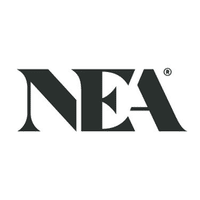
New Enterprise Associates (NEA)
New Enterprises Associates, referred to as NEA, is another leading VC committed to IT entrepreneurs in technology and healthcare. Started in 1977, today, the firm boasts a bi-coastal presence, with priority offices in Menlo Park, San Francisco, New York, and Washington, DC. NEA’s long history includes working with more than 800 companies, over half of which are now public or acquired business units.
Notable cybersecurity exits for the company include Bitglass, Cleversafe, and Cloudflare; and NEA’s other successful investments include Acquia, BlueJeans, Coursera, MongoDB, NGINX, Pentaho, Robinhood, and Upwork.
NEA Investments
| Company | Sector | Year | Status |
| Beyond Identity | Identity management | 2020 | Private |
| Expel | Managed security service | 2016 | Private |
| Tigera | Zero trust for K8s | 2016 | Private |
| Intrinsic | Application security | 2016 | Acquired: VMware |
| HackerOne | Penetration testing | 2015 | Private |
| Virtru | Data encryption | 2014 | Private |
| Cloudflare | Cloud infrastructure | 2010 | NYSE: NET |

NightDragon
Named after the infamous string of nation-state cyber attacks during the late 2000s, NightDragon was established in 2016 by former McAfee CEO Dave DeWalt. With a portfolio dedicated to cybersecurity, safety, security, and privacy innovations, NightDragon has a smaller but impressive portfolio of exited and active companies in the security space.
Notable cybersecurity exits for the company include FireEye, ForgeRock, Forescout, Jask, Mandiant, McAfee, and PhantomCyber.
NightDragon Investments
| Company | Sector | Year | Status |
| McAfee | Cybersecurity solutions | 2021 | Acquired: Intel |
| Claroty | Industrial cybersecurity | 2020 | Private |
| Illusive Networks | Threat detection and response | 2020 | Private |
| Jask | Autonomous SOC | 2018 | Acquired: Sumo Logic |
| RiskSense | Vulnerability management | 2018 | Acquired: Ivanti |
| Phantom Cyber | SOAR | 2017 | Acquired: Splunk |

Also read: Written IT Security Policies: Why You Need Them & How to Create Them
Norwest
With technology opportunities on the rise in the 1960s, Norwest Venture Partners started as a subsidiary of what is now Wells Fargo in Minneapolis, Minnesota. Sixty years later, Norwest calls Palo Alto and San Francisco home like many top VCs in cybersecurity. The company’s history includes over 600 company investments across consumer, enterprise, and healthcare segments in North America, India, and Israel.
Notable cybersecurity exits for the company include Agari, CyberX, FireEye, Fireglass, Galvanize, and KACE; and Norwest’s other successful investments include Apigee, BlueJeans, Brocade, LendingClub, Rackspace, Spotify, and Uber.
Norwest Investments
| Company | Sector | Year | Status |
| Obsidian Security | Cloud security and compliance | 2022 | Private |
| Cynet | Enterprise cybersecurity | 2018 | Private |
| Shape Security | Web security | 2018 | Private |
| CyberX | IoT and ICS security | 2018 | Acquired: Microsoft |
| Galvanize | Governance, risk, compliance | 2017 | Acquired: Diligent |
| Agari | Email security | 2016 | Private |
| Bitglass | Mobile cloud security | 2014 | Private |
| FireEye | Cybersecurity services | 2005 | Acquired: P.E. |

Paladin Capital Group
Since 2001, Paladin Capital Group has been a prominent VC serving businesses as a value-added partner in North America, Europe, South America, and Australia. Though Paladin has a smaller portfolio relative to other top contenders with 75 companies, the company has a substantial stack of strategic investments in technology, telecommunications, and more. In 2008, the Washington, DC-based firm made a prudent decision by shifting its focus to cybersecurity.
Notable cybersecurity exits for the company include CloudShield, Endgame, PhishMe, RiskSense, Trustwave, and White Ops; and Paladin’s other successful investments include Cogent, Good Technology, Initiate, QuantaLife, and VistaScape.
Paladin Investments
| Company | Sector | Year | Status |
| Virtuoso | Codeless software testing | 2021 | Private |
| Vetrix | Security scanning | 2020 | Acquired: Cloudflare |
| Karamba Security | Embedded security | 2017 | Private |
| Acalvio | Threat deception | 2014 | Private |
| Bugcrowd | Bug bounties | 2013 | Private |
| Endgame | Security intelligence | 2013 | Acquired: Elastic |
| Neohapsis | Mobile and cloud security | 2006 | Acquired: Cisco |
| Trustwave | Managed services and IT | 2004 | Acquired: Singtel |

Redpoint Ventures
Investing in technology companies since 1999, Redpoint Ventures’ focus is on entrepreneurs in the application, blockchain, fintech, healthcare, and infrastructure sectors. Redpoint offers seed up to growth series funding with a knack for partnering with startup founders early. In all, Redpoint’s over 700 investments have led to almost 300 exits. Based in Menlo Park, California, the technology VC also has a growing funding presence in China.
Notable cybersecurity exits for the company include Duo Security, Fortinet, and Caspida; and Redpoint’s other successful investments include Snowflake, Springpath, and Cloud.com.
Redpoint Investments
| Company | Sector | Year | Status |
| Cyberhaven | Data security | 2021 | Private |
| Orca Security | Cloud security | 2021 | Private |
| Duo Security | Data security | 2015 | Acquired: Cisco |
| Caspida | Threat detection | 2014 | Acquired: Splunk |
| Lastline | Network security | 2013 | Private |
| Pindrop | Authentication | 2013 | Private |
| ArcticWolf | Managed security service | 2012 | Private |
| Fortinet | Network security | 2003 | Nasdaq: FTNT |

Sequoia Capital
Sequoia Capital is arguably the top VC in cybersecurity, with five decades of experience investing in some of the biggest names in IT. Outside the United States, Sequoia’s international presence includes funds specific to Israel, India, China, Southeast Asia, and Europe and serves companies across the enterprise, consumer, and technology-enabled solution sectors. From Apple and Atari to the latest in security solutions, Sequoia’s presence is undeniable.
Notable cybersecurity exits for the company include Barracuda Networks, Palo Alto Networks, and Skyhigh; and Sequoia’s other successful investments include Cisco, Google, LinkedIn, NVIDIA, Oracle, PayPal, Snowflake, and UiPath.
Sequoia Investments
| Company | Sector | Year | Status |
| Wiz | Cloud security | 2020 | Private |
| Evervault | Developer encryption | 2019 | Private |
| Verkada | Security surveillance | 2019 | Private |
| Armis | IoT network security | 2015 | Private |
| Sumo Logic | Threat intelligence | 2014 | Nasdaq: SUMO |
| Okta | Identity management | 2013 | Nasdaq: OKTA |
| Barracuda | Enterprise security | 2006 | Private |

Read more: How Hackers Use Reconnaissance – and How to Protect Against It
Shasta Ventures
Shasta Ventures specializes in early-stage investments with a robust portfolio covering consumers, hardware, computer vision, data intelligence, infrastructure, and SaaS. Started in 2004, Shasta offers its Elevate program to help founders navigate growth with proven go-to-market methodologies. The San Francisco-based VC has almost 100 active investments and 47 exits.
Notable cybersecurity exits for the company include SentinelOne, Skycure, Watchdog, and Zenrpise; and Shasta’s other successful investments include Anaplan, Lithium, Makara, Mint.com, Nest Labs, Spiceworks, and Taskrabbit.
Shasta Investments
| Company | Sector | Year | Status |
| TrueFort | Zero trust platform | 2021 | Private |
| Cequence Security | Application security | 2019 | Private |
| SentinelOne | Endpoint protection | 2019 | NYSE: S |
| Mocana | Security software | 2019 | Acquired: DigitCert |
| ISARA | Quantum security | 2018 | Private |
| CloudPassage | Security automation | 2014 | Private |
| eSentire | Managed detection and response | 2014 | Private |
| Zenprise | Mobile device management | 2005 | Acquired: Citrix |

Ten Eleven Ventures
One of the youngest VC firms to make the list, Ten Eleven Ventures started in 2014 to invest in the best and brightest cybersecurity entrepreneurs. With just over 30 investments, the upstart VC already has an impressive track record in identifying innovative security companies and helping partners reach their exit. The San Francisco-based firm includes a team of industry and startup leaders, and a joint investment alliance with private equity firm KKR.
Notable cybersecurity exits for the company include Black Horse, Cylance, Darktrace, Hexadite, Ionic, Jask, KnowBe4, Ping Identity, Revelock, Twistlock, and Verodin.
TenEleven Investments
| Company | Sector | Year | Status |
| Cyware | SOAR and threat intelligence | 2021 | Private |
| Axis Security | Security and analytics | 2020 | Private |
| ReliaQuest | Enterprise cybersecurity | 2020 | Private |
| KnowBe4 | Awareness training | 2019 | Private |
| Vulcan | Vulnerability management | 2019 | Private |
| Offensive Security | Penetration testing | 2018 | Private |
| Cylance | Tech-enabled cybersecurity | 2015 | Acquired: Blackberry |
| Ping Identity | Identity management | 2014 | NYSE: PING |

Tiger Global Management
Almost twenty years after Tiger Global Management started its private equity business, the VC ranks among the most active investment firms globally. The New York-based company has an extensive presence in Asia and focuses on companies in the financial, consumer, software, and web sectors. Since 2003, Tiger Global Management has made over 900 investments with 120 exits.
Notable cybersecurity exits for the company include Crowdstrike and SentinelOne; and Tiger Global’s other successful investments include Alibaba, Block, GitLab, Glassdoor, LinkedIn, and Meta.
Tiger Global Investments
| Company | Sector | Year | Status |
| CHEQ | Marketing cybersecurity | 2022 | Private |
| Securden | Zero trust platform | 2022 | Private |
| Forter | Fraud prevention | 2021 | Private |
| Guardio | Browser security | 2021 | Private |
| DoubleVerify | Fraud and web scanning | 2020 | Private |
| Crowdstrike | Enterprise security | 2020 | Nasdaq: CRWD |

YL Ventures
Based in Tel Aviv and Silicon Valley, YL Ventures was launched in 2007 to bring cybersecurity innovation coming out of Israel to a global customer base. YL offers hands-on support for startup leaders in addition to an extensive network of cybersecurity industry leaders and CISOs. The Israeli security specialist boasts 23 investments with 11 exits; don’t miss the firm’s interactive map of the country’s cybersecurity startup space: CyberMap.
Notable cybersecurity exits for the company include Build Security, Hexadite, Medigate, and Seculert.
YL Ventures Investments
| Company | Sector | Year | Status |
| Cycode | Code detection and response | 2021 | Private |
| Grip | SaaS cybersecurity | 2021 | Private |
| Hunters | XDR | 2021 | Private |
| Enso | Application security | 2020 | Private |
| Twistlock | Enterprise cloud | 2019 | Acquired: PAN |
| Orca Security | Cloud security | 2019 | Private |
| Hexadite | Cybersecurity orchestration | 2019 | Acquired: Microsoft |
| Axonius | Asset management | 2017 | Private |
Also read: Top Cyber Insurance Companies
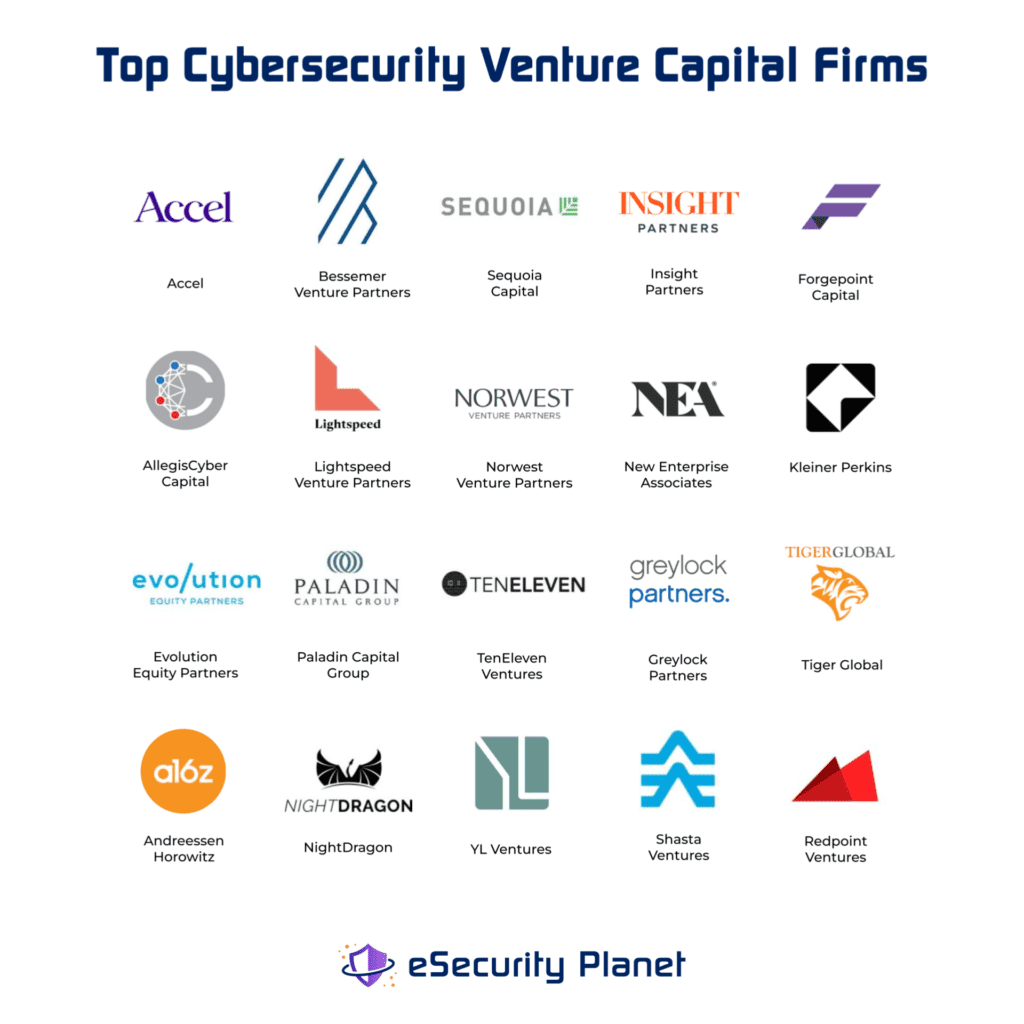
Honorable Mention Cybersecurity VCs
- Battery Ventures
- Data Collective Venture Capital (DCVC)
- Foundation Capital
- Gula Tech Adventures
- Index Ventures
- Jerusalem Venture Partners (JVP)
- Lytical Ventures
- RRE Ventures
- SoftBank
- Sorenson Ventures

Top Company-Linked VCs in Cybersecurity
- Capital One Ventures
- Cisco Investments
- Citi Ventures
- Dell Technologies Capital
- GV
- Intel Capital
- MassMutual Ventures
- Microsoft Ventures
- Salesforce Ventures
- Samsung Next
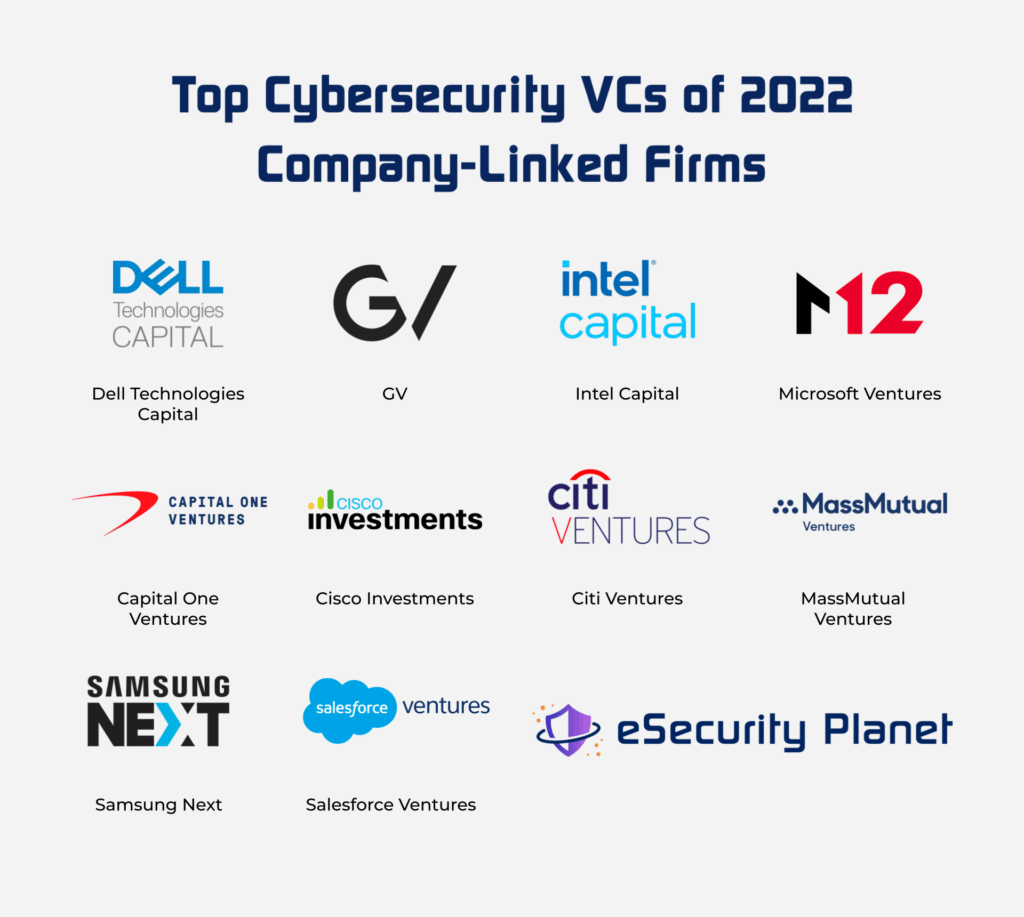
Top Seed and Early Stage VCs in Cybersecurity
- Acrew Capital
- Blumberg Capital
- Boldstart Ventures
- Charles River Ventures
- DataTribe
- Dreamit Ventures
- Floodgate
- General Catalyst
- Wing Venture Capital
- Y Combinator
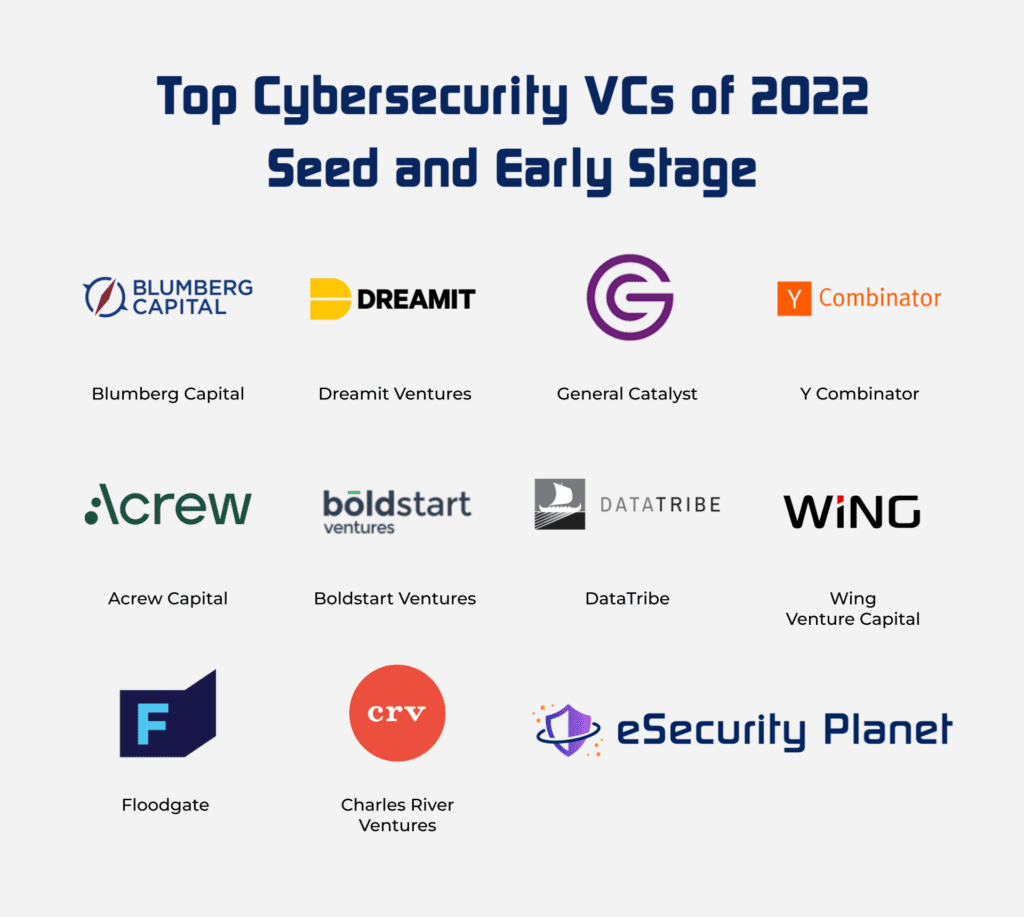
What are Venture Capital Firms?
Venture capital (VC) firms are investment management companies dedicated to funding promising business opportunities for a specified amount of equity. With expertise in discovering talented entrepreneurs and developing business infrastructure, VCs raise exorbitant money, most often through private investors.
Venture capital firms play an essential role as engines for connecting ideas and business models with the funding necessary to develop new products and services and reach new audiences or communities.
Types of VC Funding
Though there is some variation in terminology, most entrepreneurs and VCs recognize the following breakdown in funding types and purposes.
- Pre-Seed: Initial funding from non-institutional investors.
- Seed: First funding stage where a VC receives an equity stake.
- Series A: Extended development funding to bolster the company’s business model.
- Series B: Additional financing to scale business infrastructure and market reach.
- Series C: Proven track record justifies additional funding for continued growth.
- Series D and E: Less frequent and strategic in addressing business growth trajectory.
Venture Capital vs Private Equity
Whereas most citizens, workers, and retirees hold some portion of the public stock market, private equity refers to equity investments made by private individuals and private equity firms. Private equity manages the entire lifecycle of private assets, from venture capital and growth equity to managed and leveraged buyouts.
Venture capital is a form of private equity focusing on early investing opportunities; meanwhile, notable private equity firms like Blackstone, KKR, and Thoma Bravo are known for post-IPO acquisitions.
Read more: How to Protect Company Data & Assets When Employees Leave
How Do VC Firms Work?
VC firms are often limited partnerships (LP) led by General Partners (GPs) and made up of a staff managing the VC fund. Through an existing or new network of investors known as Limited Partners (LP), VC funds can raise capital for investing in a general or domain-specific portfolio of companies.
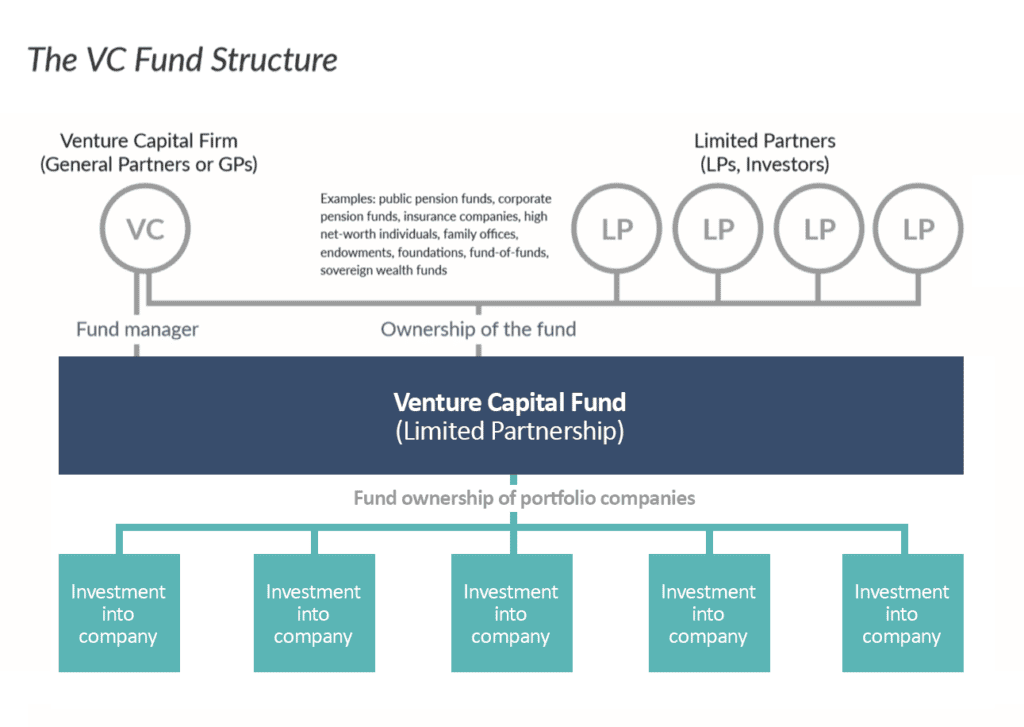
Opening the Door to Outside Influence
Though funding sounds nice, many startup nightmares come to mind. When accepting VC funding, entrepreneurs are giving up some level of control over the present or future of their company. Equity is the most evident cost to bear. Still, the fine print of VC agreements could also mean additional control over a prospective Board of Directors, management, business model, and more.
VCs are ultimately accountable to the wishes of their GPs and LPs and not afraid to make decisions to their benefit.
There’s a broad spectrum of just how active partners are in guiding or managing their investments. As VCs want their investments to succeed, hands-on partners may ask a lot of their invested companies. Founders and startup leaders can often feel the temperature and pressure rise.
Also read: Cybersecurity Outlook 2022: Third-Party, Ransomware, and AI Attacks Will Get Worse
Featured PartnersFeatured Cybersecurity Software
eSecurity Planet may receive a commission from merchants for referrals from this website
How to Land a Round of Funding
Landing a funding round is no easy task and can take months, if not years, to achieve.
Business Model
Business models have long been the cornerstone for profiling a company commercially. By enumerating foundational business components like core operations, products and services, financing, and revenue sources, startup leaders can communicate their strategic plan for launching and growing a business in a single document or presentation.
Business Data
Data is king, and VCs only have an entrepreneur’s word to trust without it. With data offering insight into sales, KPIs, and growth rates, startup leaders can justify their funding with reliable data points. With a high failure rate, startups with existing business metrics to cite are in a superior position to earn funding.
Networking
Though an exceptional business model and data can’t hurt, they mean little without access to potential funding. Local funding opportunities and accelerator programs are convenient methods of initial financing for startups. At the same time, reaching firms like the above will mean existing connections or perseverance on top of an ironclad business plan.
With an extensive VC presence split between Silicon Valley and New York, it’s no surprise entrepreneurs lean toward starting their businesses in these locations. With proximity to multiple funding partners, opportunities to reach and earn funding are more accessible.
Timing
Timing is critical to market success in the competitive landscape, especially within the ever-evolving IT ecosystem. Go-to-market strategies are an essential indicator of investment potential, and the timing of a business’s funding proposal or launch can and does make the difference. VCs seek the most innovative and new opportunities with the rare allowance for a unique spin on traditional solutions.
Questions to Consider
- What is the economic viability of the company?
- How is the solution distinct in the cybersecurity industry? Proposition value
- What are the revenue model and product deployment strategy?
- Is the solution compatible with other popular applications and security systems?
Securing Data and Infrastructure is Hot
If the last couple of years is any indication, there is no shortage of funding for cybersecurity entrepreneurs. The above VCs and more continue to look for the latest emerging technologies across industries, and securing the next generation of IT infrastructure is hot.
Entrepreneurs with a worthwhile idea or business should consider how additional funding might further develop or expand their operation. With caution in mind, VCs can offer financial support and business and industry expertise to achieve meaningful growth and profit.
Read more: Cybersecurity Employment in 2022: Solving the Skills Gap




